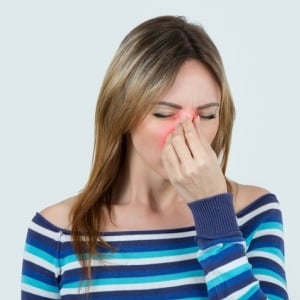
In Latin “sinus” means “curve” or “fold”. In medicine the word mostly refers to the four pairs of hollow cavities around our nose and eyes that are connected to the nose.
Your (paranasal) sinus cavities are lined with soft tissue, which are coated with mucus that keeps the tissue moist and also traps bacteria. Air passing through the sinuses on the way to the lungs is also humidified and filtered.
Blocked drainage
The sinuses need to be able to drain constantly to clear mucus. According to Harvard Health Publishing, sinusitis is caused when this drainage system becomes blocked, usually from swelling caused by inflammation. Typical symptoms are a sore head, facial pressure or pain and thick mucus clogging your nose. Sinusitis affects about one in eight adults annually.
Sinusitis is mostly caused by viruses and usually resolves spontaneously within a week to 10 days. However, anything that interferes with airflow into and drainage of mucus out of the sinuses can cause sinusitis. This includes bacteria, allergies and the common cold. (Colds or allergies, for example, will cause the lining of the nose to swell up, preventing mucus from draining properly, leading to sinusitis.)
Other, less common causes include fungi or bacteria, a deviated septum and nasal polyps.
Acute (or short duration) sinusitis normally clears up within two weeks without medical attention. Chronic sinusitis can, however, last for up to three months or longer and may require long-term treatment or consulting a specialist.
Allergies can trap mucus
Allergies can play an important role in chronic (long-lasting) or seasonal respiratory problems. An infection of the nasal mucous membrane with pressure, a runny nose and congestion is called allergic rhinitis. It is caused by an allergic response to allergens, such as pollen, dust mites or pet dander, and can lead to sinusitis by trapping mucus.
Pollen are allergens that appear during certain times of the year, while moulds, dust mites and pet dander are present throughout the year.
During spring months, the whole of South Africa has high pollen counts. The main culprits are weeds (e.g. daisy and dandelion), trees (Plane, Kareeboom and Acacia) and grasses (including crops like maize and rye).
According to a Health24 article, there are several things in your home that can lead to sinusitis:
- Dust
- Mould
- Pets
- Perfumes and toiletries
- Cleaning products
- Houseplants and flowers
- Your swimming pool
When to go to the doctor
Serious complications can result from sinus infections, and according to Health24 it is advisable to seek medical attention to identify the cause of your symptoms if:
- "Cold" symptoms last longer than 10 to 14 days or worsen over time.
- You have a severe headache that is not relieved by acetaminophen, aspirin, ibuprofen or a decongestant.
- There is increased facial swelling, or changes in vision.
- Nasal discharge changes from clear to yellow or green after five to seven days of a cold.
- You're experiencing facial pain, especially in one sinus area or along the ridge between the nose and lower eyelid.
- Sinusitis symptoms persist after a full course of antibiotics.
Image credit: iStock




 Publications
Publications
 Partners
Partners











